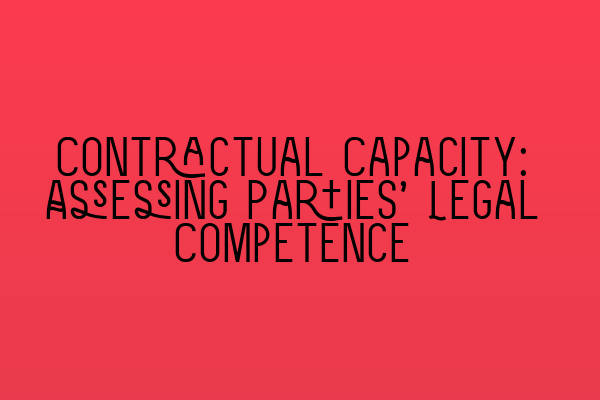Contractual Capacity: Assessing Parties’ Legal Competence
When entering into a contract, one of the fundamental requirements is that the parties involved must have the legal capacity to do so. Contractual capacity refers to the mental and legal ability of individuals or entities to understand and enter into a binding agreement.
Assessing parties’ contractual capacity is crucial to ensure the validity and enforceability of the contract. In this article, we will explore the concept of contractual capacity in more detail and discuss the factors that determine a party’s legal competence.
What is Contractual Capacity?
Contractual capacity is the legal ability of a person or entity to understand the nature and consequences of a contract and to enter into it. In simpler terms, it refers to whether a party has the mental competence and legal authority to be bound by the terms of an agreement.
Without contractual capacity, a contract may be deemed void or voidable. Void contracts are considered to have no legal effect from the beginning, while voidable contracts can be either confirmed or avoided by the party lacking capacity.
Factors Affecting Contractual Capacity
Several factors can affect a party’s contractual capacity. Let’s explore some of the key considerations:
Age
The age of a party is an essential factor in assessing contractual capacity. In most jurisdictions, minors (individuals under the age of majority, typically 18 years old) have limited capacity to enter into contracts. Minors are generally considered to lack the legal competence and experience necessary to fully understand the implications of an agreement.
However, certain contracts, such as contracts for necessaries or contracts approved by the court, may be binding on minors. Additionally, once a person reaches the age of majority, they gain full contractual capacity.
SQE 1 Practice Mocks FLK1 FLK2
Mental Capacity
Mental capacity refers to an individual’s ability to understand and make rational decisions. Parties with mental impairments, such as those with cognitive disabilities or mental illnesses, may lack the necessary mental capacity to form a contract.
In such cases, the law often provides safeguards to protect individuals with mental disabilities. Contracts entered into by parties lacking mental capacity may be voidable or unenforceable unless they were entered into during a lucid interval or with the assistance of a legal guardian.
Intoxication
Intoxication, whether through alcohol or drug use, can significantly impair a person’s judgment and decision-making abilities. As a result, contracts entered into while under the influence of intoxicants may be voidable or unenforceable.
However, it is important to note that contracts formed while intoxicated may still be binding if the intoxicated party had sufficient mental capacity to understand the agreement despite their state of intoxication.
Authority
In some cases, individuals may lack the legal authority to enter into a contract on behalf of a company, organization, or other legal entity. Only individuals with proper authorization, such as officers or representatives, can bind the entity to a contract.
It is crucial to verify the authority of the party representing the entity and ensure that they have the power to enter into the agreement. Failure to do so can render the contract void or unenforceable.
Verifying Contractual Capacity
Assessing the contractual capacity of the parties involved is an essential step in contract formation. Here are some practical tips for verifying contractual capacity:
- Request identification and legal documentation: Asking for identification and legal documentation can help establish the age and legal authority of the parties.
- Engage with legal professionals: Seeking legal advice can help navigate complex situations and ensure compliance with applicable laws.
- Conduct due diligence: When entering into contracts with organizations or entities, it is wise to research their legal structure and verify the authority of the party representing them.
- Raise concerns: If there are any doubts about a party’s contractual capacity, it is crucial to address those concerns before proceeding with the contract.
Conclusion
Contractual capacity is a vital aspect of contract law. Understanding and assessing the contractual capacity of parties involved in an agreement is crucial to ensure the validity and enforceability of the contract.
Factors such as age, mental capacity, intoxication, and authority can significantly impact a party’s ability to enter into a binding agreement. Verifying contractual capacity through identification, legal advice, due diligence, and open communication is essential to mitigate potential risks and protect the interests of all parties involved.
